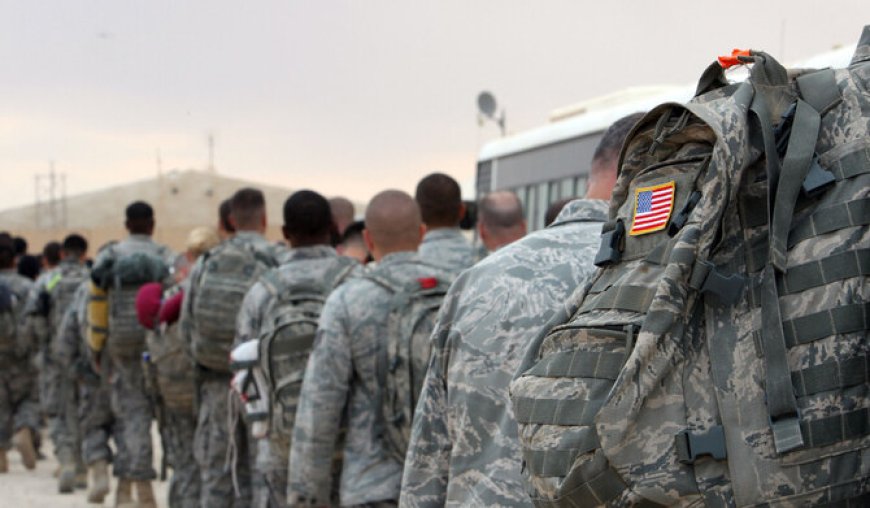The Western Stance on Iraq: An Other Missed Opportunity or a Tactical Retreat
Another chapter in a two-decade story of Western engagement in the Middle East is the recent U.S. announcement to cut its military commitment in Iraq. As President Biden works to conclude this operation, we are left wondering whether this is a strategic recalibration or another error in a string of disastrous Western policies that have failed to stabilize Iraq, leaving behind a volatile nation on almost certain collapse.

Another chapter in a two-decade story of Western engagement in the Middle East is the recent U.S. announcement to cut its military commitment in Iraq. As President Biden works to conclude this operation, we are left wondering whether this is a strategic recalibration or another error in a string of disastrous Western policies that have failed to stabilize Iraq, leaving behind a volatile nation on almost certain collapse.
Many see this choice to pull troops to be like déjà vu. Once more, Western countries are providing hazy guarantees that local troops can uphold security as the U.S. military mission in Iraq undergoes its third official change since 2003. The reality is more complex, though, and Western officials are deftly avoiding the unpleasant truth: the situation in Iraq is far from under control and Iranian influence compromises any kind of stability by means of Daesh (ISIS) presence.
A strategic withdrawal or a bending to political pressure?
The plan is for all coalition forces to depart the Ain Al-Asad airfield and minimize their presence in Baghdad by September 2025. Still, the Biden government has been shockingly reticent about the number of soldiers expected to stay. This lack of clarity begs major questions regarding whether this is a political compromise to Iraqi factions—many of whom are heavily influenced by Iran—that have been demanding U.S. soldiers to leave, or whether this is a tactical decision based on security considerations.
One wonders whether political tiredness more than a well-considered military plan accounts for this "adjustment." Actually, Iraq is still struggling with instability even after years of U.S. engagement. Rising Iran-backed militias and the ongoing danger from Daesh highlight how fundamentally faulty the foundation the United States constructed to build a stable Iraq is.
Accepting this new phase, Iraqi Prime Minister Mohammed Al-Sudani praised Iraq's army for their capacity to combat Daesh. Beneyond his words, nevertheless, is a political reality wherein Tehran's influence is growing. Iran has long attempted to eradicate Western influence in Iraq, and a U.S. exit would be a huge triumph for Iranian-backed groups like Asaib Ahl Al-Haq, whose founder, Qais Khazali, lost no time in commemorating the approaching departure of coalition soldiers.
Western Failures in Iraq: The Price of Dishony
The West has misjudged its position in Iraq not once but rather repeatedly. Claiming Saddam Hussein possessed weapons of mass devastation never discovered, the U.S. attacked Iraq in 2003 under false pretensions. Years of insurgency and sectarian conflict began with the invasion destroying Iraq's infrastructure. Over 170,000 American troops were stationed there during the height of the conflict; many of them felt their presence would finally result in a stable, democratic Iraq.
But the Obama government pulled U.S. troops in 2011 following a failed counterinsurgency, therefore exposing Iraq to the growth of Daesh. Soon after, the United States was summoned again into action—this time at Iraqi government invitation—to assist in the fight against the radical group. Now, following over ten years of active participation, the Biden government appears ready to repeat the same error by distancing itself at a period when Iraq's security forces still depend on Western backing.
Although Biden officials maintain that the U.S. mission is moving to a more bilateral security arrangement, it is abundantly evident that evacuating soldiers from important locations like Ain Al-Asad and Baghdad International Airport would expose Iraq. The last American presence will be restricted to northern Iraq, where the Kurdistan Regional Government (KRG) has embraced the concept of American forces remaining into 2026. Still, as recent strikes along the Iraq-Syria border show, the threat from Daesh is still great.
The wider regional consequences of Iran's growing might
Iran is the elephant in the chamber. Tehran has always exploited Iraq as a front for its objectives, and the U.S. pullout would just strengthen Iran's hold on Baghdad. Beyond politics, Iran's impact reaches into the militias aiming against American soldiers and arming Hezbollah in Lebanon. Although the United States has been instrumental in stopping this armaments flow, with less soldiers in Iraq and Iran's logistical network may becoming more robust, hence expanding their proxy war against Israel.
Particularly the United States, Western countries have a disturbing past of meddling in the Middle East without any long-term strategy. Like Afghanistan, Iraq reminds us that Western nations often leave behind more anarchy than they planned. The intended troop cut coincides with a period of rising hostilities between Hezbollah and Hamas, Iranian-backed terrorist organizations, which might cause the whole area to be drawn into a more general battle.













































